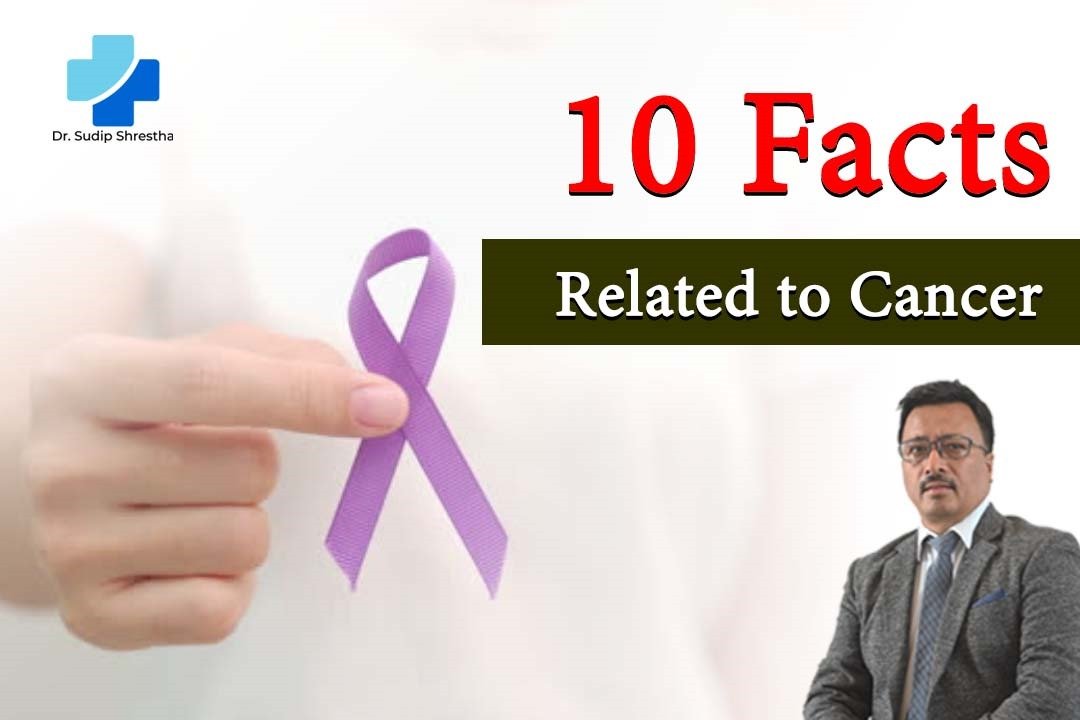Cancer is a prevalent and complex disease that affects millions worldwide, including many in Nepal. Despite advancements in medical science, many misconceptions still surround cancer. Dr. Sudip Shrestha, a Senior Consultant Medical Oncologist, provides valuable insights into this challenging disease. Here are ten essential facts related to cancer that everyone should know.
1.Cancer is Not a Single Disease
One of the most important facts related to cancer is that cancer is not a single disease but a group of related diseases. There are over 100 different types of cancer, each classified based on the type of cell that is initially affected. Dr. Sudip Shrestha, a respected medical oncologist, explains that this diversity makes cancer diagnosis and treatment highly complex, as each type of cancer behaves differently and requires a specific approach to treatment.
2.Early Detection Saves Lives
Another key fact related to cancer is the importance of early detection. Early detection of cancer significantly increases the chances of successful treatment. Regular screenings and awareness of early symptoms are crucial. Dr. Sudip Shrestha, a seasoned cancer doctor, emphasizes that cancers detected at an early stage are often more treatable and have higher survival rates. Screening methods like mammograms, colonoscopies, and Pap smears can help detect cancers before they become symptomatic.
3.Lifestyle Choices Impact Cancer Risk
Lifestyle choices play a significant role in cancer risk, which is another critical fact related to cancer. Dr. Sudip Shrestha notes that tobacco use, excessive alcohol consumption, poor diet, and physical inactivity are significant risk factors. By adopting a healthier lifestyle, individuals can reduce their risk of cancer. Eating a balanced diet rich in fruits and vegetables, maintaining a healthy weight, exercising regularly, and avoiding tobacco and excessive alcohol can contribute to cancer prevention.
4.Genetics Play a Role
While lifestyle factors are crucial, genetics also play a significant role in cancer risk, which is another important fact related to cancer. Some individuals inherit genetic mutations that increase their susceptibility to certain types of cancer. Dr. Sudip Shrestha, a renowned medical oncologist, highlights the importance of genetic counseling and testing for individuals with a family history of cancer. Understanding one’s genetic risk can lead to more personalized and proactive cancer screening and prevention strategies.
5.Cancer Treatment is Multifaceted
Cancer treatment is not one-size-fits-all and often involves a combination of therapies. This is a significant fact related to cancer. Dr. Sudip Shrestha, an experienced chemotherapy doctor, explains that treatment options can include surgery, radiation therapy, chemotherapy, immunotherapy, and targeted therapy. The choice of treatment depends on the type and stage of cancer, as well as the patient’s overall health. Advances in medical research have led to more effective and less invasive treatment options, improving patient outcomes.
6.Immunotherapy is a Game Changer
One of the most significant advancements in cancer treatment is immunotherapy, which is another essential fact related to cancer. This innovative approach helps the body’s immune system recognize and attack cancer cells. Dr. Sudip Shrestha, a dedicated cancer doctor, points out that immunotherapy has shown remarkable success in treating certain cancers, such as melanoma and lung cancer. By boosting the immune response, immunotherapy offers new hope for patients with previously untreatable cancers.
7.Cancer Survivorship is Increasing
Thanks to advances in early detection and treatment, cancer survivorship is on the rise. This is another encouraging fact related to cancer. Dr.Sudip Shrestha shares that millions of people around the world are living beyond a cancer diagnosis. Survivorship care, which includes regular followups, managing long-term side effects, and maintaining a healthy lifestyle, is essential for improving the quality of life for cancer survivors. Support networks and resources are also vital for emotional and psychological well-being.

8.Cancer Research is Ongoing
Continuous research is crucial for advancing our understanding of cancer and developing new treatments, which is another critical fact related to cancer. Dr. Sudip Shrestha, a committed medical oncologist, emphasizes that ongoing clinical trials and research studies are vital for discovering more effective and less toxic treatments. Participation in clinical trials can provide patients access to cutting-edge therapies and contribute to the broader fight against cancer.
9.Palliative Care is Essential
Palliative care is an integral part of cancer treatment, focusing on improving the quality of life for patients with advanced cancer. This is an important fact related to cancer. Dr. Sudip Shrestha, a compassionate chemotherapy doctor, explains that palliative care addresses symptoms such as pain, nausea, and fatigue, and provides emotional and spiritual support. This holistic approach ensures that patients receive comprehensive care that goes beyond treating the disease itself.
10.Public Awareness and Education are Key
Raising public awareness and educating people about cancer is crucial for early detection and prevention, which is the final key fact related to cancer. Dr. Sudip Shrestha, a proactive cancer doctor, advocates for community outreach programs, health campaigns, and educational initiatives to inform the public about cancer risk factors, symptoms, and the importance of regular screenings. By spreading knowledge, we can empower individuals to take proactive steps towards cancer prevention and early detection.
Conclusion
Cancer is a multifaceted disease that requires a comprehensive understanding and approach. Dr. Sudip Shrestha, a leading medical oncologist and chemotherapy doctor, provides valuable insights into the importance of early detection, lifestyle choices, genetic factors, advanced treatments, and continuous research. By increasing awareness and education about cancer, we can work towards reducing its impact and improving outcomes for patients in Nepal and beyond.



